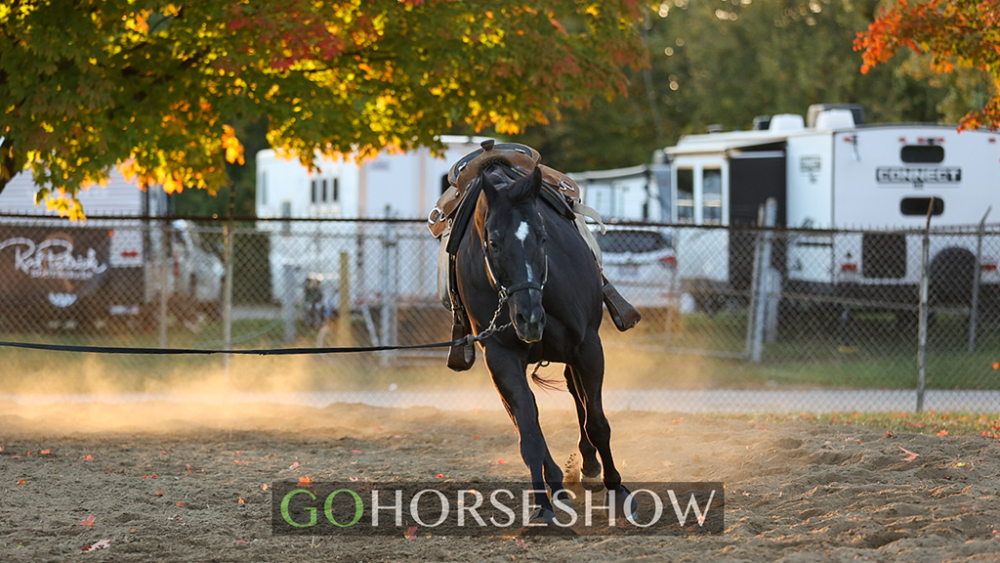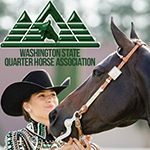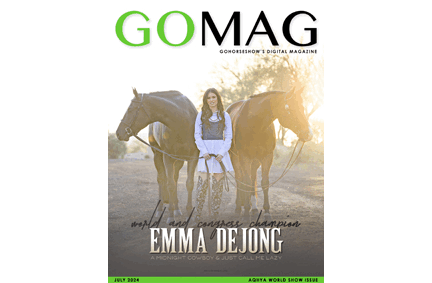Training horses is a dangerous sport, and we asked several elite trainers in our industry some questions regarding how they protect themselves from injury. Every year there are tragic horse-related accidents. It is almost an unwritten rule that it is not “if” but “when” it will happen in their profession.
We asked professional horsemen some hot-button questions. Have they been in a training/horse-related accident? What did they learn from it? How do they protect themselves from injury? Do they have ways to judge if a prospect is unsafe to ride? Do they have a colt breaker? Any insight or advice for others?
With a wealth of knowledge, these top professionals in our industry share expert advice that hopefully may help save others from horse-related accidents down the road.
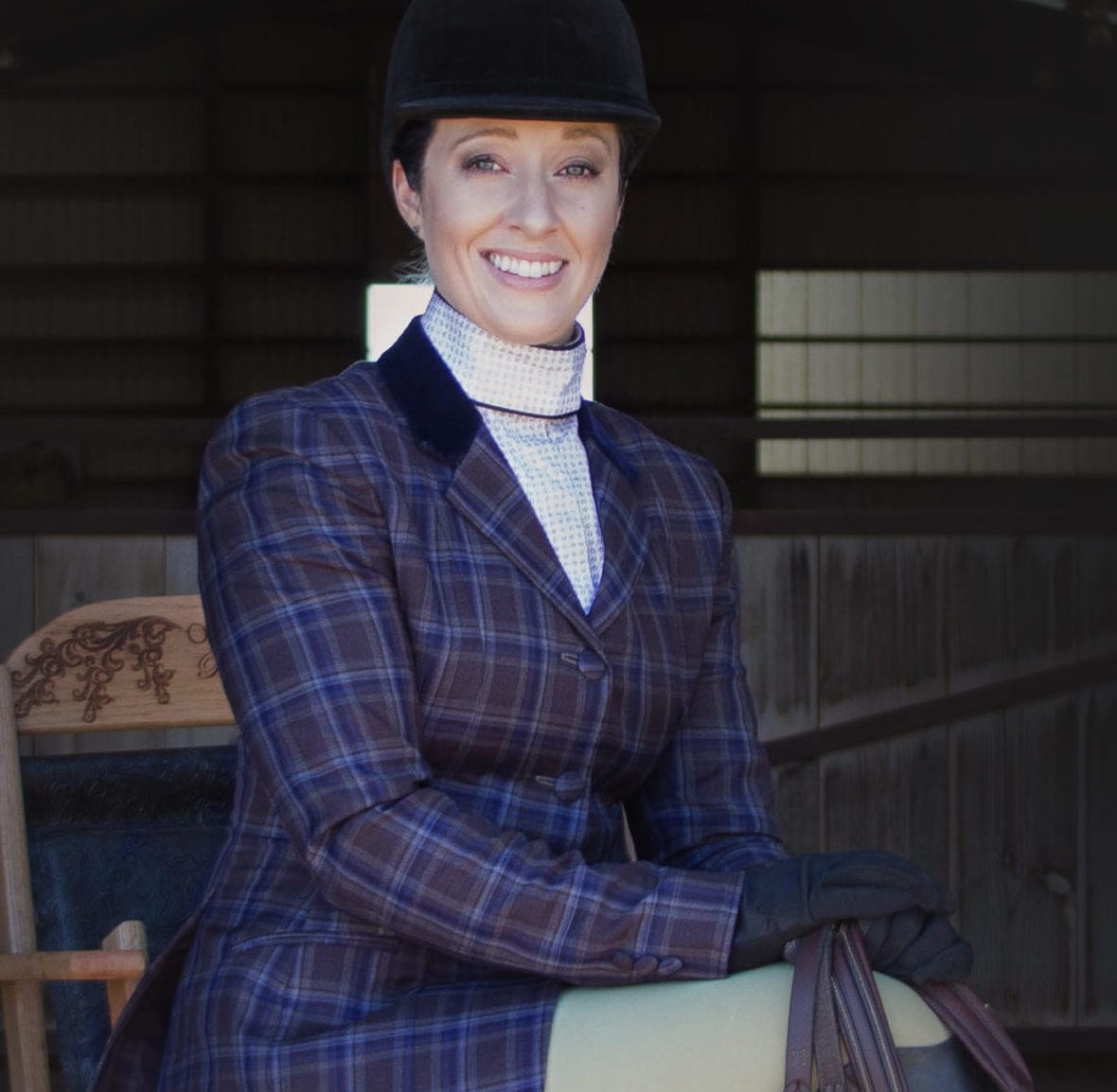 Alyse Roberts – There have been what seems like a lot of horse-related accidents lately, and it definitely makes me stop and think twice and be more aware. Although, I feel like a lot of the time it’s freak accidents that you don’t see coming. I start all my own babies, and I definitely spend extra time doing groundwork and don’t get on them until I feel comfortable…each horse is different. I’ve also gotten to the point that if I don’t feel comfortable with the horse, I will send it on. I also do not ride after my barn help leaves for the day. I don’t like to be riding by myself, so I’ll do round pen work or other odd jobs that need to be done. I have always made sure that I have some type of health insurance. Even when I was younger and didn’t have my US citizenship, I still was able to get a policy through Blue Cross Blue Shield so at least I had some kind of insurance in case of a major accident. At the end of the day, I think we all have to take a step back and respect that we work with large, strong animals on a daily basis, and we can’t take for granted how easily we could get hurt, so always think ahead and try to stay out of those sticky situations.
Alyse Roberts – There have been what seems like a lot of horse-related accidents lately, and it definitely makes me stop and think twice and be more aware. Although, I feel like a lot of the time it’s freak accidents that you don’t see coming. I start all my own babies, and I definitely spend extra time doing groundwork and don’t get on them until I feel comfortable…each horse is different. I’ve also gotten to the point that if I don’t feel comfortable with the horse, I will send it on. I also do not ride after my barn help leaves for the day. I don’t like to be riding by myself, so I’ll do round pen work or other odd jobs that need to be done. I have always made sure that I have some type of health insurance. Even when I was younger and didn’t have my US citizenship, I still was able to get a policy through Blue Cross Blue Shield so at least I had some kind of insurance in case of a major accident. At the end of the day, I think we all have to take a step back and respect that we work with large, strong animals on a daily basis, and we can’t take for granted how easily we could get hurt, so always think ahead and try to stay out of those sticky situations.
 Katy Jo Zuidema – I’m 40 and still very good, but not what I was when I was 25. Even I know that, and I’m a proud woman. We have to smarten up and our timing isn’t what it once was. Keep young people around you and let them do the tough stuff. My common horse sense is still epic, but I understand if I’m not wrestling young stock every day, then I’m rusty. So, I take a step back. Also, our health insurance is the best we can afford. It’s not just the horses, one of us could get hit by a bus. We can afford a broken leg but we can’t afford a week on life support etc. That’s real-world stuff.
Katy Jo Zuidema – I’m 40 and still very good, but not what I was when I was 25. Even I know that, and I’m a proud woman. We have to smarten up and our timing isn’t what it once was. Keep young people around you and let them do the tough stuff. My common horse sense is still epic, but I understand if I’m not wrestling young stock every day, then I’m rusty. So, I take a step back. Also, our health insurance is the best we can afford. It’s not just the horses, one of us could get hit by a bus. We can afford a broken leg but we can’t afford a week on life support etc. That’s real-world stuff.
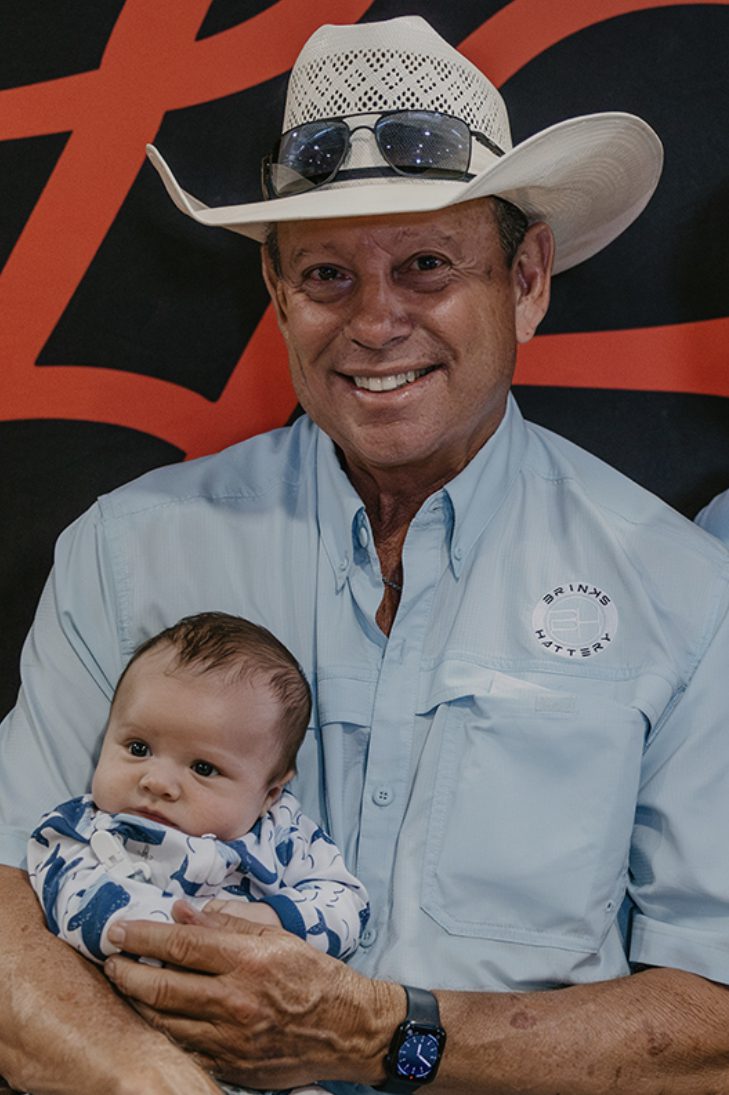 Leonard Berryhill – The closest I’ve come to being seriously injured, or worse, was attempting to unload a mare from my six-horse trailer. I had opened her partition and moved to her head with the intention of unsnapping her tie and backing her out. She decided she was going out before I could unsnap her, and she began to fight the tie really hard, slinging her head and fighting with her front feet, all the while I was trapped and unable to escape. My guardian angel was working overtime that day as I got out with bumps and bruises and possibly a slight concussion. Leigh, of course, went totally nuts. When it was all over, thankfully the mare was okay and I, being pretty shaken up, was eventually okay too. Lesson learned. I will never enter a trailer with a tied horse. I now always release the trailer tie and approach with caution. We should not be afraid when we unload a horse, but caution should always be taken, especially if you’re not familiar with the horse. Wrecks and injuries are part of what we do for a living, but, if experience and caution are taken, fewer accidents will occur.
Leonard Berryhill – The closest I’ve come to being seriously injured, or worse, was attempting to unload a mare from my six-horse trailer. I had opened her partition and moved to her head with the intention of unsnapping her tie and backing her out. She decided she was going out before I could unsnap her, and she began to fight the tie really hard, slinging her head and fighting with her front feet, all the while I was trapped and unable to escape. My guardian angel was working overtime that day as I got out with bumps and bruises and possibly a slight concussion. Leigh, of course, went totally nuts. When it was all over, thankfully the mare was okay and I, being pretty shaken up, was eventually okay too. Lesson learned. I will never enter a trailer with a tied horse. I now always release the trailer tie and approach with caution. We should not be afraid when we unload a horse, but caution should always be taken, especially if you’re not familiar with the horse. Wrecks and injuries are part of what we do for a living, but, if experience and caution are taken, fewer accidents will occur.
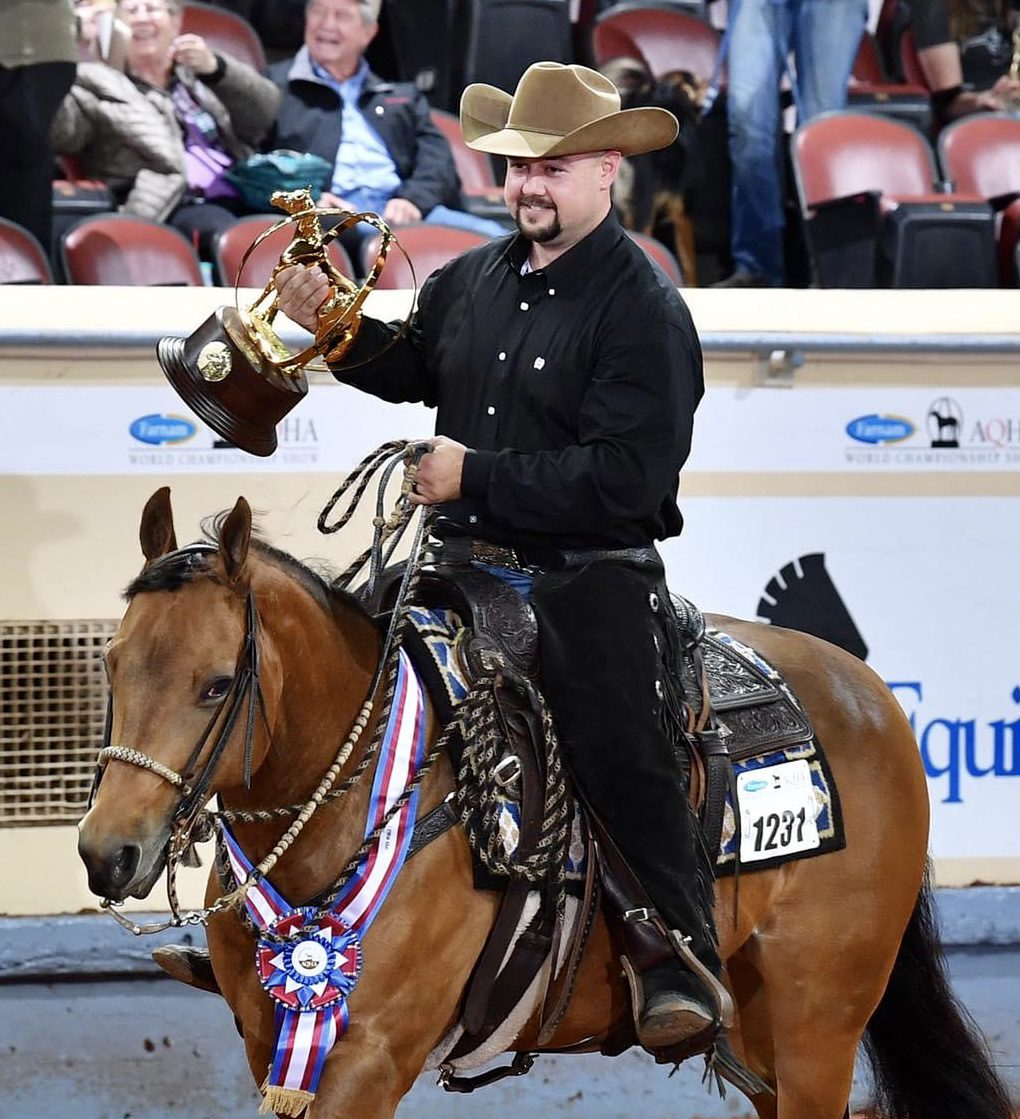 Clayton Jerrell – I have not been seriously injured in quite some time. The last time was around ten years ago. I had a horse knock me out and had some lingering effects of that for a while, but all I have now is a scar on the back of my head. I learned that no matter how old or how seasoned a horse is, they are still loving animals with a mind of their own, and you can never let your guard down. Anything can scare them at any moment, and they do not care if you are in their way or not. Now, I try to read every situation and watch their eyes and ears because if they are uncomfortable, they will try to give you a warning most of the time. I probably spend more time longing than I did when I was younger, as well. I do break colts out every year, however, I am getting more selective about the colts I bring in and I do spend more time on groundwork than ever before. As far as judging a prospect on how safe it is to ride or not, I really try to think about any horses I’ve had previously with similar breeding and get a plan together going into each particular horse’s daily regimen. There are some breeding lines that I try to avoid now, especially for the colt starting side of things. I grew up on the racetrack and have always had a bit of superstitious tendencies such as reading whorls and watching for “white” eyes, both of which certainly have some substantial evidence as to why they are still considered in horse training and picking out prospects. I would also like to add that it is very important to have insurance.
Clayton Jerrell – I have not been seriously injured in quite some time. The last time was around ten years ago. I had a horse knock me out and had some lingering effects of that for a while, but all I have now is a scar on the back of my head. I learned that no matter how old or how seasoned a horse is, they are still loving animals with a mind of their own, and you can never let your guard down. Anything can scare them at any moment, and they do not care if you are in their way or not. Now, I try to read every situation and watch their eyes and ears because if they are uncomfortable, they will try to give you a warning most of the time. I probably spend more time longing than I did when I was younger, as well. I do break colts out every year, however, I am getting more selective about the colts I bring in and I do spend more time on groundwork than ever before. As far as judging a prospect on how safe it is to ride or not, I really try to think about any horses I’ve had previously with similar breeding and get a plan together going into each particular horse’s daily regimen. There are some breeding lines that I try to avoid now, especially for the colt starting side of things. I grew up on the racetrack and have always had a bit of superstitious tendencies such as reading whorls and watching for “white” eyes, both of which certainly have some substantial evidence as to why they are still considered in horse training and picking out prospects. I would also like to add that it is very important to have insurance.
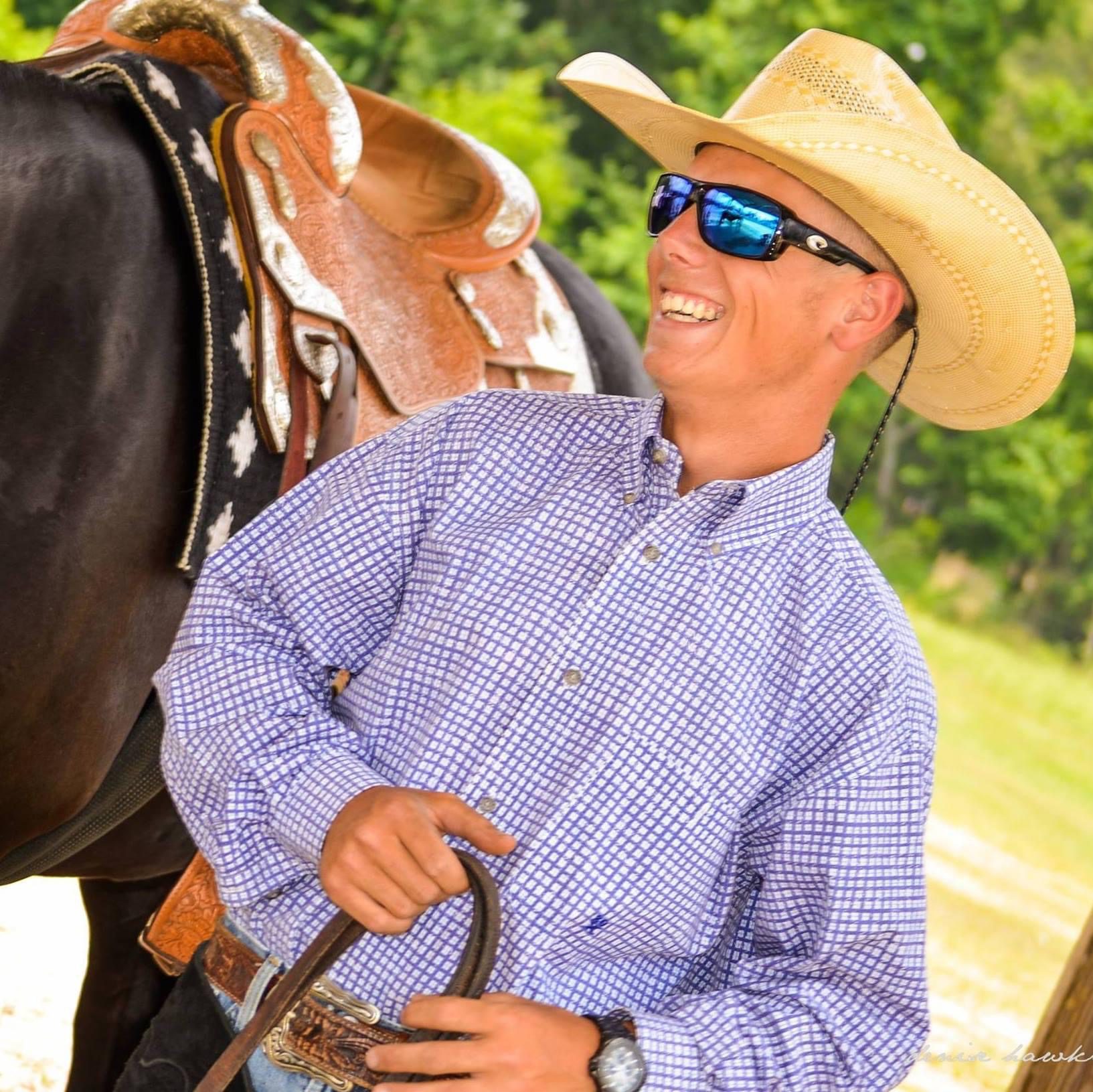 Adam Mathis – I have had several accidents or close calls. I think each one of them has taught me something different. But, at the same time, it’s a reminder to stay alert, and not to take any horse for granted. I think every time I have had a close call or an accident, I remember that situation and how it began to develop. I try extremely hard to use that as a learning experience. I think any horseman, especially those of us who deal with a lot of young horses, has different ways to judge whether a colt is ready to get on, or not. Again, I think those are things you pick up from the places you worked, and from the accidents or close calls that you’ve had. But, at the end of the day, each horse is an individual with a mind and heart of its own. You learn how to read a horse’s body language, to get some sort of feel for how it is going to react to something that is unfamiliar to it. There again, accidents are just that, accidents. No one knows when or where they may happen. I think as long as you keep a cautiously optimistic mindset and try to treat each horse as an individual and not take him/her for granted, then you’ve done all you can do to protect yourself. Pasley and I do not personally use a colt breaker, because we like to do it here in-house. It is something that we enjoy, though both of us realize how important it is for each horse to be started in a confident, well-rounded manner.
Adam Mathis – I have had several accidents or close calls. I think each one of them has taught me something different. But, at the same time, it’s a reminder to stay alert, and not to take any horse for granted. I think every time I have had a close call or an accident, I remember that situation and how it began to develop. I try extremely hard to use that as a learning experience. I think any horseman, especially those of us who deal with a lot of young horses, has different ways to judge whether a colt is ready to get on, or not. Again, I think those are things you pick up from the places you worked, and from the accidents or close calls that you’ve had. But, at the end of the day, each horse is an individual with a mind and heart of its own. You learn how to read a horse’s body language, to get some sort of feel for how it is going to react to something that is unfamiliar to it. There again, accidents are just that, accidents. No one knows when or where they may happen. I think as long as you keep a cautiously optimistic mindset and try to treat each horse as an individual and not take him/her for granted, then you’ve done all you can do to protect yourself. Pasley and I do not personally use a colt breaker, because we like to do it here in-house. It is something that we enjoy, though both of us realize how important it is for each horse to be started in a confident, well-rounded manner.
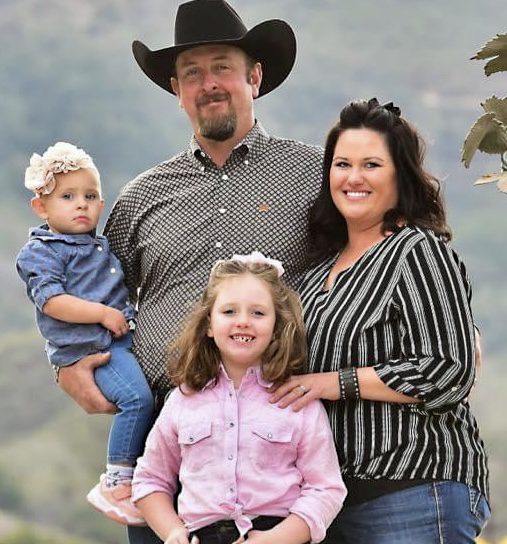 Justin Wheeler – After a really bad accident in 2021, a horse we had for a couple of weeks flipped over on me out of nowhere, for no good reason. I broke my pelvis and had to have surgery. I had three massive pulmonary embolisms but made it through several months of scary complications post surgery. I learned that training horses is only a job and at the end of the day, it is only that, so don’t put yourself in dangerous situations for the customer or the chance to win a little prize that nobody will remember in a couple weeks. If one is going through a stage in training that is on the tougher side, I take my time and try to fix things through groundwork or less risky ways. But, it is an unavoidable risk we all take the second we get on a horse, that’s why they call it an accident. Last December, I was loping a really good two-year-old around, and it stumbled and fell down and I broke two ribs. So, you can be as careful as you want, but it is something you have to be willing to risk whenever you train a horse. We still start all of our own 2-year-olds because we want to guarantee that there are no skipped stages or holes in their beginning training stages. When I start the show training process that comes next, I want to know that I can trust that horse 100 percent.
Justin Wheeler – After a really bad accident in 2021, a horse we had for a couple of weeks flipped over on me out of nowhere, for no good reason. I broke my pelvis and had to have surgery. I had three massive pulmonary embolisms but made it through several months of scary complications post surgery. I learned that training horses is only a job and at the end of the day, it is only that, so don’t put yourself in dangerous situations for the customer or the chance to win a little prize that nobody will remember in a couple weeks. If one is going through a stage in training that is on the tougher side, I take my time and try to fix things through groundwork or less risky ways. But, it is an unavoidable risk we all take the second we get on a horse, that’s why they call it an accident. Last December, I was loping a really good two-year-old around, and it stumbled and fell down and I broke two ribs. So, you can be as careful as you want, but it is something you have to be willing to risk whenever you train a horse. We still start all of our own 2-year-olds because we want to guarantee that there are no skipped stages or holes in their beginning training stages. When I start the show training process that comes next, I want to know that I can trust that horse 100 percent.
Jenn Wheeler (pictured above) – We just set some stronger boundaries and rules in what we are willing to work with now, since we’ve survived “the worst”. We ask clients to put their two-year-old prospects in training by September 1 of their yearling year now, so that they have the proper foundation, groundwork, and time put into them before starting them under saddle. It’s a lot easier on the horses too if they get this time in. We take our time with every horse that comes in and we do not allow the clients to put any pressure on results or timelines so there are no missed steps. We also have helicopter insurance now…definitely have helicopter insurance. I cannot tell you how wonderful NSBA was through all of what we went through, and I think everyone should support the NSBA Crisis Fund.
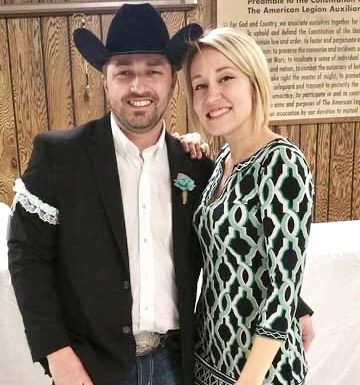 Ceralena Gray – I actually had my jaw and nose broken and fractured my face in 2015. I’ll work on a horse a little longer now, instead of just jumping on fresh. We start all our colts. Each one’s different in their growth and maturity level, so they don’t all get started at the same time. Jeremy and I send one home if it’s dangerous. A couple of months of training isn’t worth a hospital bill or worse. I think a lot of the injuries are caused by pressure. Pressure from clients to get the horse ready fast, from the industry to have it ready by a certain time, a particular futurity or world show or whatever it may be. The biggest thing for us is, if it’s not ready, don’t push it. That’s when you’re almost guaranteed to get into trouble. It’s not worth getting hurt over. I really don’t think there’s much you can do to protect yourself, this is a dangerous occupation, even with the mildest of horses.
Ceralena Gray – I actually had my jaw and nose broken and fractured my face in 2015. I’ll work on a horse a little longer now, instead of just jumping on fresh. We start all our colts. Each one’s different in their growth and maturity level, so they don’t all get started at the same time. Jeremy and I send one home if it’s dangerous. A couple of months of training isn’t worth a hospital bill or worse. I think a lot of the injuries are caused by pressure. Pressure from clients to get the horse ready fast, from the industry to have it ready by a certain time, a particular futurity or world show or whatever it may be. The biggest thing for us is, if it’s not ready, don’t push it. That’s when you’re almost guaranteed to get into trouble. It’s not worth getting hurt over. I really don’t think there’s much you can do to protect yourself, this is a dangerous occupation, even with the mildest of horses.
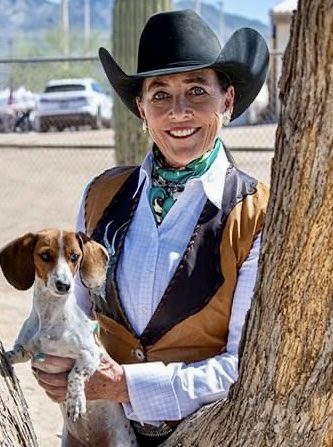 Laurel Walker Denton – I think everyone in our business has been injured in one form or another. Health insurance is a must for anyone making a living in the equine industry. It needs to be as important as any monthly bill. There are ways to keep the cost down with high deductibles, non-smoking discounts, etc. Today, I do not start my colts and prefer to not ride anything younger than three. The most important thing I can say is to listen to that little warning or feeling that you get from a horse that something is about to happen or is not quite right. When I broke my leg, it was a very cold, windy, early morning on a green horse at a new facility for him. It was my horse, not a customer’s. I wanted to get him ridden before my day started. He gave me all sorts of warnings, but I opted to stick to my “show” plan and get it done. As I get older, I listen better and smarter. Tomorrow is another day and hopefully a safer one. Not to sound “preachy”, but health insurance is not an option, it is a must.
Laurel Walker Denton – I think everyone in our business has been injured in one form or another. Health insurance is a must for anyone making a living in the equine industry. It needs to be as important as any monthly bill. There are ways to keep the cost down with high deductibles, non-smoking discounts, etc. Today, I do not start my colts and prefer to not ride anything younger than three. The most important thing I can say is to listen to that little warning or feeling that you get from a horse that something is about to happen or is not quite right. When I broke my leg, it was a very cold, windy, early morning on a green horse at a new facility for him. It was my horse, not a customer’s. I wanted to get him ridden before my day started. He gave me all sorts of warnings, but I opted to stick to my “show” plan and get it done. As I get older, I listen better and smarter. Tomorrow is another day and hopefully a safer one. Not to sound “preachy”, but health insurance is not an option, it is a must.
 Margaux Tucker – I have been in a horse-related accident, or two. As a trainer, I had a young horse fall sideways and land on my leg, with no major injury. I do my groundwork much more methodically now. Once a young horse gives to the pressure of a bit or side-pull well on the ground, and is desensitized to all things (like weight and flapping things on their back), then I feel confident, being that I am a small female, that I can ask of them what is necessary. Fortunately for me too, I do not have to send horses to someone else to work through issues, and I do not need a colt breaker. I have great help with colts built in my relationship. Dylan is a true horseman and is great with exposing horses to all sorts of things outside of most people’s (and horse’s) comfort zone.
Margaux Tucker – I have been in a horse-related accident, or two. As a trainer, I had a young horse fall sideways and land on my leg, with no major injury. I do my groundwork much more methodically now. Once a young horse gives to the pressure of a bit or side-pull well on the ground, and is desensitized to all things (like weight and flapping things on their back), then I feel confident, being that I am a small female, that I can ask of them what is necessary. Fortunately for me too, I do not have to send horses to someone else to work through issues, and I do not need a colt breaker. I have great help with colts built in my relationship. Dylan is a true horseman and is great with exposing horses to all sorts of things outside of most people’s (and horse’s) comfort zone.
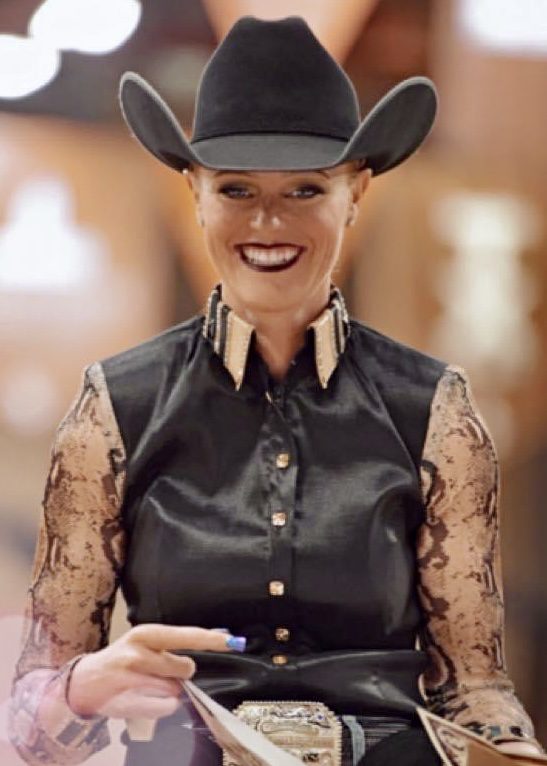 Ashley Merchant – Actually, this year I got kicked in the ribs and shattered one and broke another one. I learned that anything can happen at any given moment, no matter how many horses you have been around. I just make sure I’m aware of all my situations and horses because they are all different. I am the colt starter, so I make sure mine can take a joke, as I call it, before I get on, and they are used to me doing whatever I need to do to get on and off and sacked out.
Ashley Merchant – Actually, this year I got kicked in the ribs and shattered one and broke another one. I learned that anything can happen at any given moment, no matter how many horses you have been around. I just make sure I’m aware of all my situations and horses because they are all different. I am the colt starter, so I make sure mine can take a joke, as I call it, before I get on, and they are used to me doing whatever I need to do to get on and off and sacked out.
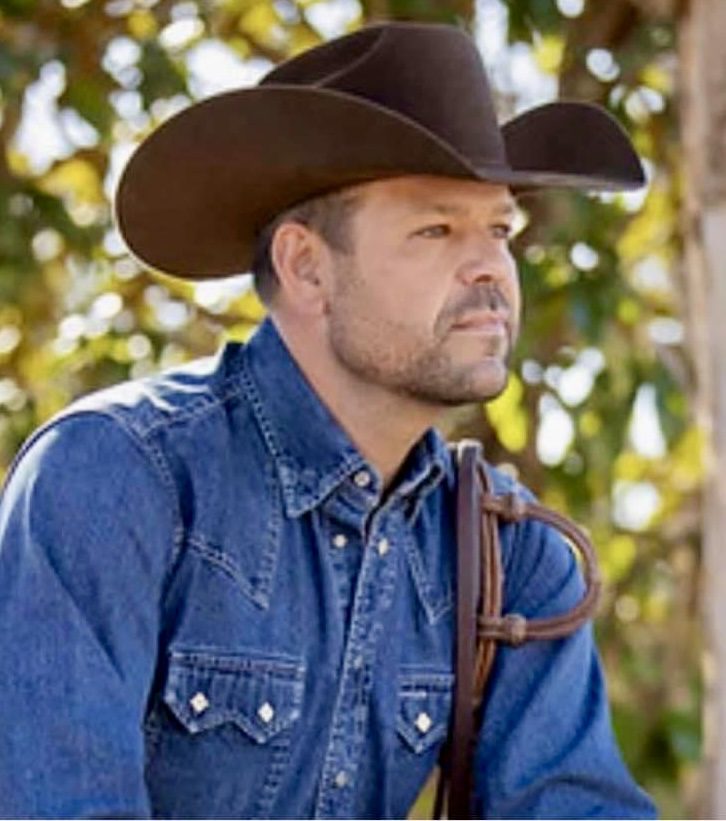 Jimmy Daurio – It’s been over 12 years since I was in a horse-related accident. That particular accident, the horse stumbled and fell down on me. There was no way to prevent that accident. We deal with these animals day in and day out and sometimes there are things that happen that can’t be prevented. As I have gotten older and my business is different than it was, I used to ride any horse that was sent to me. Now, if I feel that they are going to be a major problem or dangerous at all, I don’t take them. Any colts I get, I send out to a colt breaker. My body doesn’t bounce like it used to when I hit the ground. I am not too proud to just tell an owner that the horse won’t work in my program if I feel it is going to be a problem.
Jimmy Daurio – It’s been over 12 years since I was in a horse-related accident. That particular accident, the horse stumbled and fell down on me. There was no way to prevent that accident. We deal with these animals day in and day out and sometimes there are things that happen that can’t be prevented. As I have gotten older and my business is different than it was, I used to ride any horse that was sent to me. Now, if I feel that they are going to be a major problem or dangerous at all, I don’t take them. Any colts I get, I send out to a colt breaker. My body doesn’t bounce like it used to when I hit the ground. I am not too proud to just tell an owner that the horse won’t work in my program if I feel it is going to be a problem.
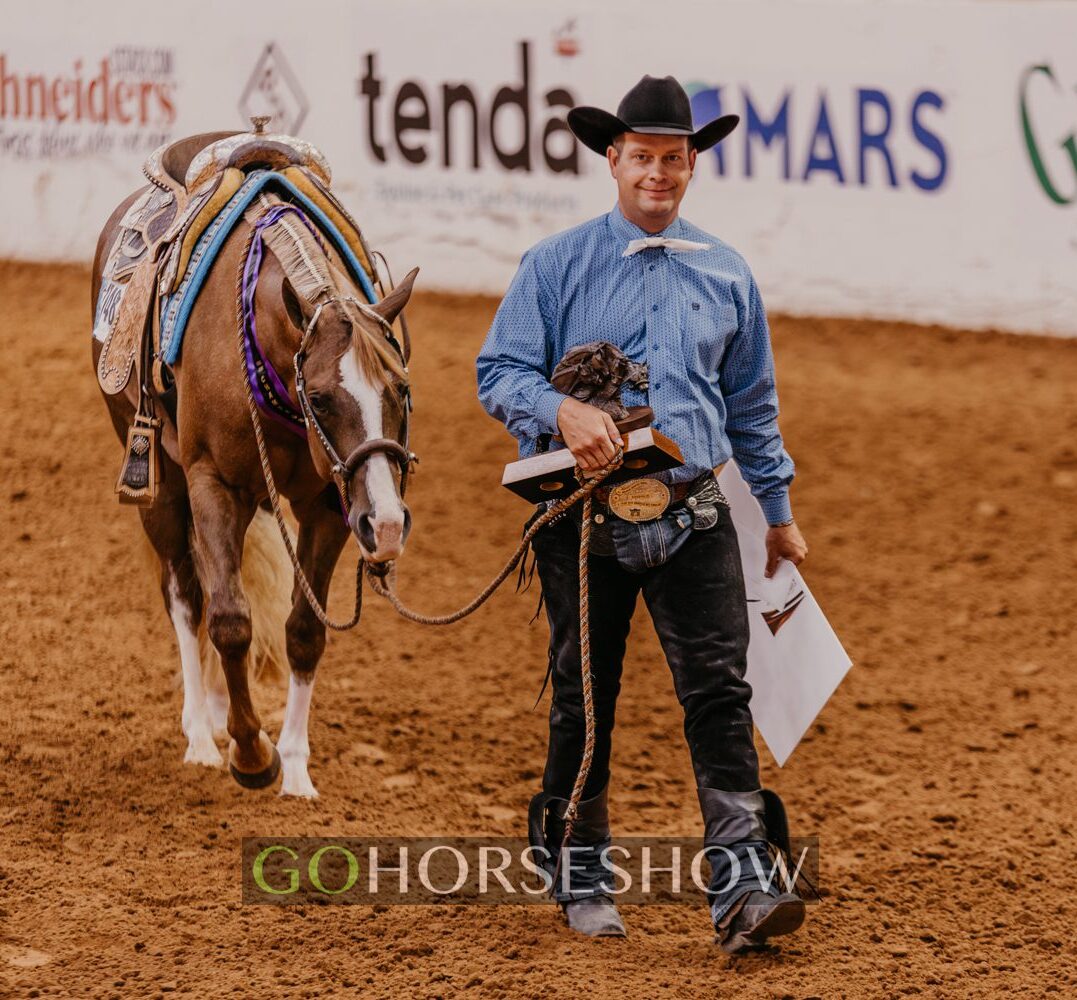 Denton DeBuhr – I’ve not really been injured from a horse-related accident…knock on wood. I start most of my own colts, and I’ve dealt with some bad habits. I try to ask questions about the horses that are coming in and see if they have any bad habits or anything before I get started. As far as colts go, I think groundwork is important, and building trust before I get on them for the first time.
Denton DeBuhr – I’ve not really been injured from a horse-related accident…knock on wood. I start most of my own colts, and I’ve dealt with some bad habits. I try to ask questions about the horses that are coming in and see if they have any bad habits or anything before I get started. As far as colts go, I think groundwork is important, and building trust before I get on them for the first time.
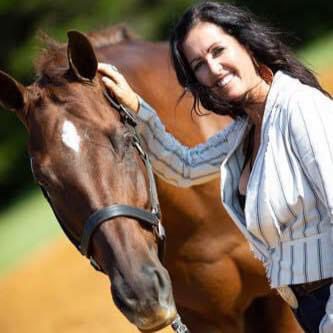 Farley McLendon – I’ve had some crazy moments and made it through. I do have a bad back which is the worst. I used to do it all myself. I’ve taken them from the first ride to the winner’s circle. Now, I do handle and get them saddle, walker, and wash rack broke before they go to the colt breaker, so I usually know how they act before someone climbs on. I have had several that I refused to ride. Needless to say, they never made it to the show pen.
Farley McLendon – I’ve had some crazy moments and made it through. I do have a bad back which is the worst. I used to do it all myself. I’ve taken them from the first ride to the winner’s circle. Now, I do handle and get them saddle, walker, and wash rack broke before they go to the colt breaker, so I usually know how they act before someone climbs on. I have had several that I refused to ride. Needless to say, they never made it to the show pen.
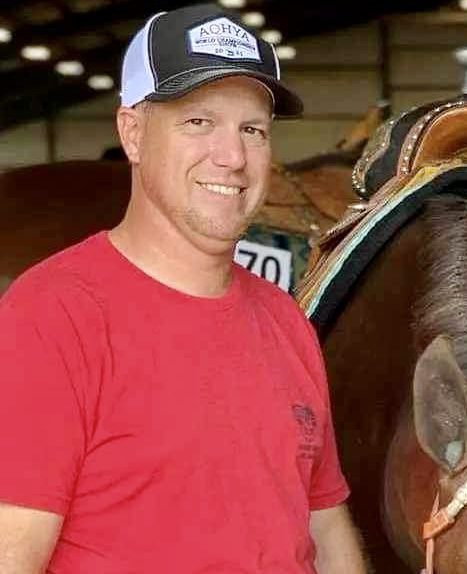 Shawn Alter – I don’t break a lot of colts anymore, but when I do, I don’t work alone. I learned when working with my dad how much safer and more effective I can be breaking one out with a good helper. I have been fortunate to never get really seriously hurt. I’ve had a concussion and been flipped or fallen on a handful of times and had to do a few days on crutches. I do ride alone a lot, so I make sure to have my phone on me in case of emergency. I have learned that now that I’m north of 40, it takes a little longer to recover from hitting the ground. I am fortunate to have great health insurance through my wife’s job, and I have made sure to have good life insurance as well, so if anything does happen, I am not a burden on my children or wife. I feel as I gained more experience, I have learned to evaluate situations with horses better and can evaluate how to handle them better. I also have learned to have an open line of communication with some trusted peers to discuss horses and different methods to get them through a tough spot, keeping their and my safety in mind, yet still being effective in training.
Shawn Alter – I don’t break a lot of colts anymore, but when I do, I don’t work alone. I learned when working with my dad how much safer and more effective I can be breaking one out with a good helper. I have been fortunate to never get really seriously hurt. I’ve had a concussion and been flipped or fallen on a handful of times and had to do a few days on crutches. I do ride alone a lot, so I make sure to have my phone on me in case of emergency. I have learned that now that I’m north of 40, it takes a little longer to recover from hitting the ground. I am fortunate to have great health insurance through my wife’s job, and I have made sure to have good life insurance as well, so if anything does happen, I am not a burden on my children or wife. I feel as I gained more experience, I have learned to evaluate situations with horses better and can evaluate how to handle them better. I also have learned to have an open line of communication with some trusted peers to discuss horses and different methods to get them through a tough spot, keeping their and my safety in mind, yet still being effective in training.
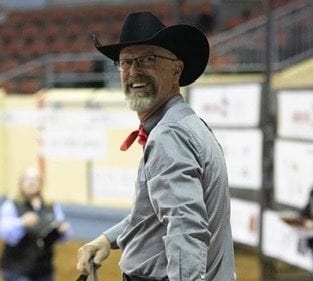 Kelly McDowall – Thankfully, I have always escaped injury other than the normal aches and pains. Because of a bad back in my younger days and encouragement from my physical therapist wife Marnie, I added stretching to my (not quite daily but I try) routine and that has helped very much. I haven’t done any colt-breaking in a few years. I have just sent them out. But, that is a part of the process that I miss a lot, and this year I will be starting at least a few. I don’t think too many of the pleasure-bred babies are unsafe anymore; they’re usually quite tame about it and the hardest part sometimes is to get them to move. If I get one that seems unusually wild, I have a friend I will send them to break out. He enjoys the wild part more than I do.
Kelly McDowall – Thankfully, I have always escaped injury other than the normal aches and pains. Because of a bad back in my younger days and encouragement from my physical therapist wife Marnie, I added stretching to my (not quite daily but I try) routine and that has helped very much. I haven’t done any colt-breaking in a few years. I have just sent them out. But, that is a part of the process that I miss a lot, and this year I will be starting at least a few. I don’t think too many of the pleasure-bred babies are unsafe anymore; they’re usually quite tame about it and the hardest part sometimes is to get them to move. If I get one that seems unusually wild, I have a friend I will send them to break out. He enjoys the wild part more than I do.
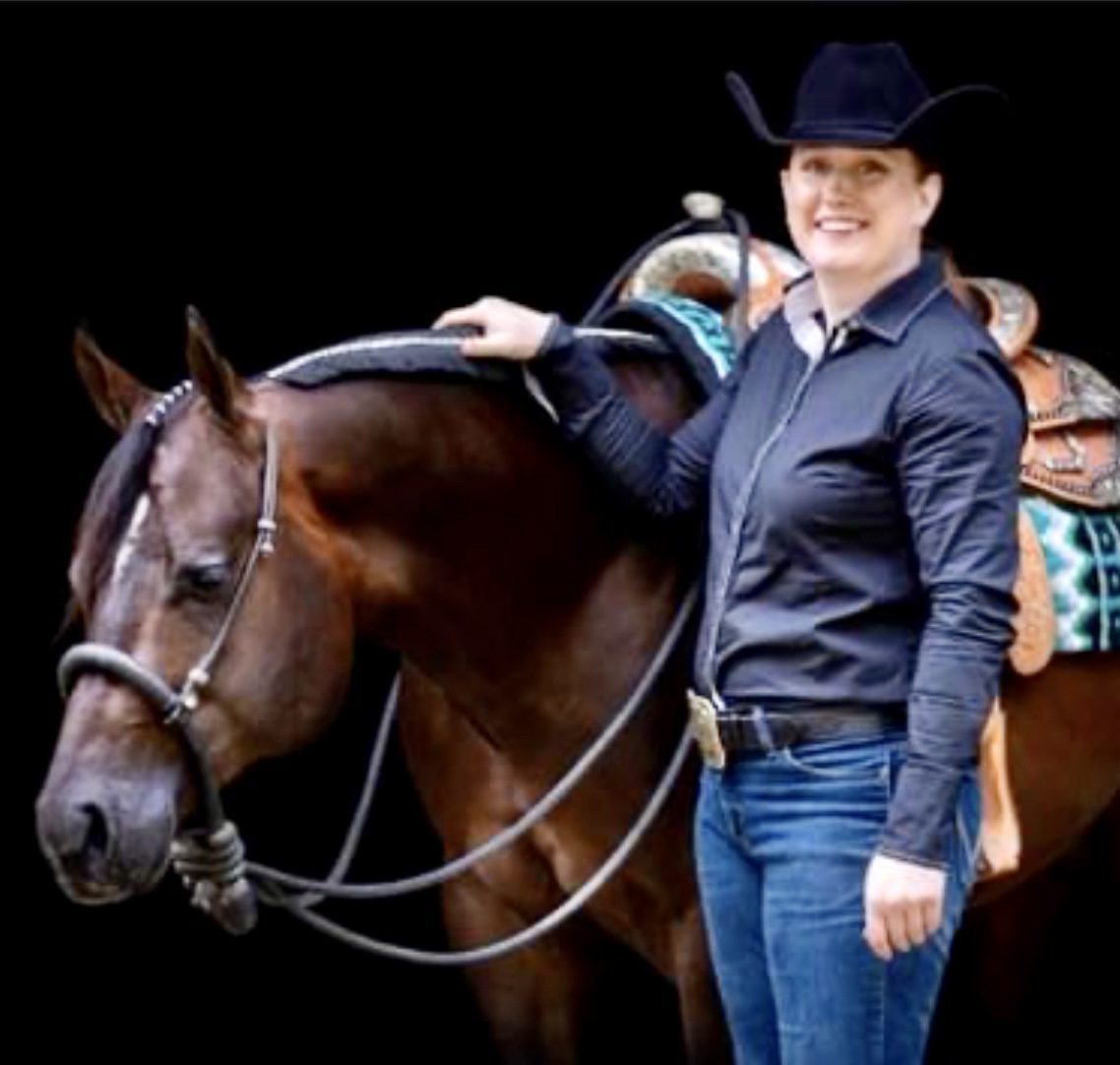 Chelsea Carlson – Injury has been at the forefront of my mind this year as less than a year ago, following the 2022 show season, I took a bad fall off one and was bedridden for a few weeks. My injury healed 100 percent because I was able to take the time and had the support to do so. It did get in my head for the months following as I think, after you experience pain that intense, you want to protect yourself as best you can. Although I do still start my own colts, I tell owners that I take more time ensuring we both are set up for success. However, some of it is just out of our control. I had one fall on me just this week, due to their hind end slipping out from under them. This is not a horse that would ever want to hurt me, but almost did in an instant. I believe we take a risk every time we get into the saddle, and the best thing we can do for ourselves is to acknowledge it, try to keep ourselves and the horses in a positive space mentally, and invest in good health insurance. Getting hurt as a trainer is not an “if”, it’s a “when” unfortunately.
Chelsea Carlson – Injury has been at the forefront of my mind this year as less than a year ago, following the 2022 show season, I took a bad fall off one and was bedridden for a few weeks. My injury healed 100 percent because I was able to take the time and had the support to do so. It did get in my head for the months following as I think, after you experience pain that intense, you want to protect yourself as best you can. Although I do still start my own colts, I tell owners that I take more time ensuring we both are set up for success. However, some of it is just out of our control. I had one fall on me just this week, due to their hind end slipping out from under them. This is not a horse that would ever want to hurt me, but almost did in an instant. I believe we take a risk every time we get into the saddle, and the best thing we can do for ourselves is to acknowledge it, try to keep ourselves and the horses in a positive space mentally, and invest in good health insurance. Getting hurt as a trainer is not an “if”, it’s a “when” unfortunately.
If you have pointers or routines to help you be safe when working with horses, let our readers know in our social media comments.


